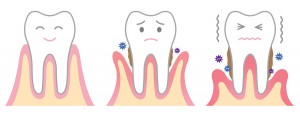
Gum Disease is progressive and requires professional help to cure.
To maintain your oral health, it’s necessary to keep your gums strong and healthy. Therefore, it’s extremely important to protect yourself from the dangers of two conditions: Gingivitis and periodontitis (gum disease).
You might wonder, though: What is the difference between gingivitis and gum disease? And if I suffer from one or the other, how important is it that I seek treatment?
Gingivitis
Gingivitis is a mild disease that affects the gums. It is characterized by inflammation and the gums changing color, both of which are caused by bacteria in the mouth.
Sufferers of gingivitis may notice the following symptoms:
- Swollen gums
- Gums that have turned red or purple
- Gums that are tender or painful to touch
- Bleeding (especially after brushing and/or flossing)
- Bad breath (Halitosis)
Because gingivitis is often not very painful, many suffer from the disease unknowingly. This emphasizes the importance of getting examined by your dentist regularly. If properly diagnosed and treated with a good oral routine, the effects of gingivitis will be reversed.
If left untreated, however, gingivitis may eventually progress to become periodontitis.
Periodontitis (Gum Disease)
Periodontitis (also known as advanced periodontal disease or gum disease) is an actual infection of the gums. As bacteria continues to attack the gums, the inner layer of the gum eventually pulls away from the teeth. The small space or pocket that is created further collects bacteria, eventually becoming infected. In periodontitis, bacteria has sufficiently built up in or around the gum tissue to the point that the body cannot contain or reverse the infection.
Those suffering from periodontitis may show all the signs of gingivitis. Additional symptoms may include:
- Receding gums
- Mouth sores
- Appearance of deep pockets between teeth and gums
- Loose (or shifting) teeth
Since periodontitis is more advanced than gingivitis, the effects are also more serious. Bacteria that reaches the area below the gum line, will eventually attack the bone and tissue that hold teeth in position – possibly causing teeth to loosen and fall out. Since the fluids in the mouth travel throughout the body, the bacteria that cause gum disease may even enter the blood stream and spread. Researchers have linked gum disease to serious conditions such as heart attack, stroke, diabetes, and pre-term birth.
Get Help
If you feel that you demonstrate symptoms of either of these conditions, you should see your dentist as soon as possible. Call us at Rock Creek Dental today and we will be happy to set up an appointment.
Schedule Your Gum Disease Consultation
